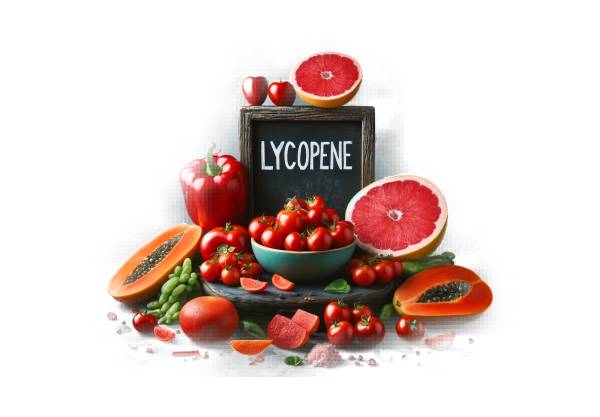
Lycopene, a potent antioxidant most famously found in tomatoes, is increasingly recognized for its potential in promoting robust eye health and clearer vision. Scientific discoveries reveal that this bright red carotenoid can help protect sensitive ocular tissues from oxidative stress, support optimal blood flow within the eyes, and mitigate the damaging effects of blue light. Whether you’re concerned about age-related changes, eye fatigue from extensive screen use, or simply wish to preserve your visual acuity, integrating lycopene into your nutritional routine may provide significant advantages. In this article, we examine the ways lycopene may reinforce your visual system, spotlight key usage tips, and review current research.
Table of Contents
- What Exactly is Lycopene?
- Mechanisms of Lycopene in Enhancing Vision
- Primary Eye Health Gains with Lycopene
- Suggested Ways to Use Lycopene for Optimal Ocular Wellness
- Data from Studies and Ongoing Research on Lycopene
- Frequently Asked Questions about Lycopene
- References and Sources
What Exactly is Lycopene?
Lycopene is a naturally occurring pigment belonging to the carotenoid family, responsible for the vibrant red hue of fruits and vegetables like tomatoes, watermelon, and pink grapefruit. As a fat-soluble antioxidant, lycopene excels at quelling oxidative stress—unbalanced free radicals that can harm cells—throughout the body. This makes it an essential nutrient for systemic health, ranging from cardiovascular support to skin protection.
Where Does it Come From?
- Tomatoes and Tomato Products
Lycopene is most abundantly found in tomatoes. Cooking tomatoes and combining them with small amounts of fat increases lycopene’s bioavailability, making tomato-based sauces, soups, and pastes effective dietary sources. - Other Red and Pink Produce
Watermelon, pink grapefruit, guava, and papaya also supply varying levels of lycopene. Including these fruits in your routine can help ensure a diverse carotenoid intake.
Why is it Critical for Eye Health?
- Antioxidant Capacity
Lycopene’s robust antioxidant properties counteract free radical damage, which is especially beneficial in protecting delicate structures such as the retina and lens from cumulative wear and tear. - Potential Anti-Inflammatory Effects
Preliminary research hints that lycopene can help moderate inflammation, crucial for maintaining a healthy ocular environment that’s less prone to irritation, dryness, and degenerative changes.
Contemporary Use in Supplements
- Convenient Standardized Dosages
With dietary variability, supplementing with lycopene in capsule or softgel form offers a consistent, predictable intake. Many commercial products specify the exact milligram content of lycopene per serving. - Combining with Other Nutrients
Often included in multi-ingredient eye health formulations, lycopene works synergistically with other carotenoids (lutein, zeaxanthin) and essential fatty acids (omega-3s) to reinforce multiple pathways of ocular wellness.
From mitigating oxidative stress to aiding in the upkeep of vital eye structures, lycopene emerges as a valuable component of a holistic strategy for maintaining robust vision. Understanding its natural sources and mechanisms sets the stage for exploring how best to harness its benefits.
Mechanisms of Lycopene in Enhancing Vision
Lycopene’s influence on eye health can be explained by its intricate biochemical interactions. By focusing on oxidative control, light filtration, and vascular support, lycopene lays a comprehensive foundation for improved vision.
Blocking Free Radical Damage
- Antioxidant Shield
- Lycopene neutralizes reactive oxygen species (ROS) generated by prolonged light exposure, metabolic processes, and environmental toxins.
- This interception of ROS protects the retina from oxidative degradation, thereby preserving photoreceptor cell integrity.
- Preventing Lipid Peroxidation
- The retina contains high concentrations of polyunsaturated fatty acids, which are particularly vulnerable to lipid peroxidation.
- Lycopene’s antioxidant function helps guard these fats from oxidation, safeguarding the structural membranes essential for translating light into visual signals.
Filtering High-Energy Visible Light
- Absorption of Harmful Wavelengths
- Although lutein and zeaxanthin are the primary carotenoids recognized for filtering blue light, lycopene may offer an auxiliary layer of photoprotection.
- This effect can be crucial in an era of extensive digital device usage.
- Reducing Glare and Eye Fatigue
- By limiting high-energy light from reaching the retina, lycopene may diminish glare sensitivity, thus improving comfort for tasks demanding prolonged focus.
Modulating Inflammatory Pathways
- Cytokine Regulation
- Research suggests that lycopene could downregulate pro-inflammatory cytokines, preventing or delaying inflammatory responses that lead to ocular conditions like dry eye syndrome or posterior uveitis.
- Such regulation maintains a calmer environment within the eye.
- Balancing Immune Responses
- Chronic, low-grade inflammation in the eyes can accelerate degenerative changes. Lycopene supports a balanced immune reaction, deterring excessive inflammatory assaults on ocular tissues.
Supporting Microcirculation and Vascular Integrity
- Improved Blood Flow to the Retina
- Healthy vision depends on a steady supply of oxygen and nutrients to the retina. Lycopene may bolster vascular function, aiding microcirculation essential for sustaining retinal cell activities.
- Enhanced microcirculation helps flush out metabolic byproducts, keeping ocular tissues cleaner and more functional.
- Maintenance of Capillary Walls
- By aiding the structural proteins in blood vessels, lycopene helps maintain capillary integrity. This can reduce the risk of microbleeds or fluid buildup within the eye, linked to complications like diabetic retinopathy.
Synergy with Other Eye-Focused Nutrients
- Carotenoid Allies
- Lycopene can complement the actions of lutein and zeaxanthin, enhancing overall protection against blue light and oxidative harm.
- This synergy is often leveraged in specialized eye health formulations.
- Omega-3 Fatty Acids and Vitamins
- Combining lycopene with DHA/EPA (omega-3s) and antioxidant vitamins (A, C, E) can heighten its beneficial impact on tear film stability, retinal function, and lens clarity.
By addressing oxidative stress, filtering harmful light, curbing inflammation, and nurturing the eye’s microcirculation, lycopene offers a multifaceted blueprint for bolstering vision. Appreciating these underlying processes underscores why lycopene is garnering attention among both researchers and health-conscious consumers.
Primary Eye Health Gains with Lycopene
If you’re seeking a nutrient that can bolster various aspects of eye function, lycopene stands out as a promising candidate. Its far-reaching effects range from structural protection of the retina to alleviating the everyday strain caused by digital devices.
1. Reduced Risk of Age-Related Macular Degeneration (AMD)
- Shielding the Macula
AMD is a foremost cause of vision loss among older adults. Lycopene contributes to the macula’s defense through its antioxidant activity, potentially slowing AMD’s progression or reducing its likelihood. - Synergistic Effect with Other Carotenoids
When paired with nutrients like lutein and zeaxanthin, lycopene can offer a comprehensive protective approach for the macula.
2. Protection Against Cataract Formation
- Preserving Lens Proteins
Cataracts develop as proteins in the lens become oxidized and clump together. Lycopene helps safeguard these proteins, maintaining lens clarity and preventing the cloudiness characteristic of cataracts. - Long-Term Vision Clarity
Consistent antioxidant support from lycopene ensures that the lens remains transparent over time, sustaining crisp and bright vision well into advanced years.
3. Support for Retinal Health
- Combatting Retinopathy
Chronic oxidative stress can hasten conditions like diabetic retinopathy. Lycopene’s capacity to bolster vascular integrity and manage inflammation can reduce retinal stress and its subsequent complications. - Stable Photoreceptor Function
Photoreceptors in the retina depend on lipids easily susceptible to peroxidation. Lycopene helps preserve these lipids, maintaining effective signal transduction from the retina to the brain.
4. Alleviation of Digital Eye Fatigue
- Blue Light Dampening
While not the primary carotenoid for blue light filtration, lycopene adds an extra protective dimension that may help mitigate the harmful impact of screens and artificial lighting. - Reduced Eye Strain
Combined with good screen habits, lycopene’s anti-inflammatory and antioxidant features can lessen dryness, discomfort, and the fatigue associated with prolonged digital device use.
5. Enhanced Ocular Comfort
- Lowered Inflammatory Responses
Lycopene’s anti-inflammatory potential can help quell mild eye irritation and dryness, contributing to overall comfort and improved tear film stability. - Less Vulnerability to Irritants
By strengthening ocular tissues at a cellular level, lycopene may make the eyes more resilient against everyday environmental irritants.
6. Holistic Eye and Systemic Benefits
- Glaucoma and Other Conditions
While further research is needed, some findings suggest that antioxidants like lycopene may play a supportive role in conditions linked to elevated ocular pressure, such as glaucoma. - Broader Health Advantages
Known for improving heart health and antioxidant capacity, lycopene’s systemic benefits can indirectly support vascular health in the eyes as well.
When considering the breadth of these advantages—from staving off common age-related issues to mitigating the daily strain induced by modern lifestyle factors—it becomes clear that lycopene is a potent ally in maintaining optimal eye health. Integrating this carotenoid can be a decisive step toward ensuring your vision remains sharp and resilient.
Suggested Ways to Use Lycopene for Optimal Ocular Wellness
Embracing lycopene as part of an eye-care program involves selecting the right forms, determining suitable dosages, and complementing the supplement with lifestyle measures. Below are strategic approaches to ensure you reap the maximum vision benefits from lycopene.
Choosing Effective Lycopene Sources
- Whole-Food Diet
- Tomatoes: Cooked tomatoes (tomato sauce, paste, soups) typically boast higher bioavailability of lycopene than raw tomatoes.
- Watermelon and Pink Grapefruit: These fruits offer a refreshing alternative for those looking to diversify their sources.
- Guava and Papaya: Tropical fruits containing moderate lycopene can add variety and taste to your meal plan.
- Concentrated Supplements
- Capsules or Softgels: A popular choice for measured dosing, often standardized to contain a specific milligram of lycopene.
- Liquids and Tinctures: Less common but can be easily mixed into beverages and meals, offering flexible application.
Optimal Dosage Recommendations
- General Guidelines
- Research often highlights a daily range of 10 to 30 mg of lycopene for significant antioxidant and ocular benefits, though needs vary among individuals.
- Factors like age, existing eye conditions, and dietary habits influence the appropriate dosage.
- Timing and Absorption Tips
- Fat Soluble: Consuming lycopene with a small amount of healthy fat (olive oil, avocado, nuts) enhances absorption.
- Split Dose if Necessary: Splitting daily intake into two smaller doses can maintain stable blood levels throughout the day, especially if higher amounts are needed.
Combining Lycopene with Other Nutrients
- Synergistic Pairings
- Zeaxanthin and Lutein: A powerful trio of carotenoids working together to protect the macula from different angles.
- Omega-3 Fatty Acids: Known for maintaining the tear film and inflammatory control, these healthy fats can magnify lycopene’s ocular benefits.
- Vitamin C, E, and Zinc
- These micronutrients also curb oxidative stress. Joint supplementation can cover multiple pathways of ocular protection, from lens clarity to retinal fortification.
Lifestyle Practices to Strengthen Lycopene’s Effects
- Moderate Screen Time
- Employ the 20-20-20 rule: every 20 minutes, look at something 20 feet away for 20 seconds. This helps mitigate eye strain from continuous near-field focus.
- Adjust screen brightness and use blue light filters, leveraging lycopene’s antioxidant support.
- Physical Activity and Adequate Rest
- Regular exercise promotes better microcirculation, ensuring nutrients like lycopene effectively reach ocular tissues.
- Quality sleep supports cellular repair and stress relief, enhancing the nutrient’s restorative advantages.
- Limitations on Processed Foods
- High-sugar, heavily processed meals can increase oxidative and inflammatory stress, counteracting some benefits of lycopene.
- A balanced diet rich in fiber, whole grains, and lean proteins synergizes with antioxidant nutrients to uphold long-term eye health.
Monitoring Outcomes and Adjusting Usage
- Professional Consultations
- Keep in close communication with an eye-care professional. They can track changes such as improvements in visual acuity or reduced dryness, validating your lycopene regimen.
- Symptom Tracking
- Log changes in eye comfort, vision clarity, or frequency of dryness and irritation to gauge whether dosage adjustments or additional supportive nutrients may be required.
By balancing high-quality food or supplemental sources, aligning dosage with individual needs, and maintaining supportive lifestyle habits, you can harness lycopene’s broad protective scope. Over time, this strategy can pay dividends in bolstering your vision and overall ocular vitality.
Data from Studies and Ongoing Research on Lycopene
While lycopene has been extensively studied for its cardioprotective and anticancer potential, investigations focusing on ocular wellness are also gathering momentum. Findings from both preclinical experiments and clinical settings reveal promising roles for lycopene in preserving and enhancing vision.
Laboratory Investigations and Preclinical Evidence
- Cellular Antioxidant Activity
- Test-tube studies confirm that lycopene excels at quenching singlet oxygen, a highly reactive species that can injure retinal cells.
- By preventing lipid peroxidation in retinal membranes, lycopene maintains structural integrity, foundational for effective photoreceptor performance.
- Inhibiting Inflammatory Pathways
- Animal models demonstrate that lycopene can lower the expression of pro-inflammatory cytokines in ocular tissues, correlating with diminished signs of irritation and vascular leakage.
- These results suggest that lycopene may be beneficial in conditions driven by chronic inflammation, including diabetic retinopathy.
Human Trials and Observational Studies
- High Lycopene Diet and Reduced AMD Risk
- Although macular carotenoids like lutein and zeaxanthin have historically taken center stage in AMD prevention, some observational data link diets abundant in lycopene-containing foods (e.g., tomatoes) with a decreased incidence of AMD.
- While correlation doesn’t prove causation, the data imply that lycopene might complement these other carotenoids in staving off macular damage.
- Capsule Supplementation Studies
- Small-scale human trials evaluating lycopene supplementation for conditions like AMD, cataracts, or general eye strain show improvements in markers of oxidative stress and subjective eye comfort.
- More extensive clinical trials are needed to pin down standardized dosages and the precise benefits for advanced ocular conditions.
Potential for Additional Ocular Applications
- Glaucoma
- Preliminary animal research suggests that lycopene’s antioxidant properties may help preserve the optic nerve under elevated intraocular pressure, warranting further exploration into its role in glaucoma management.
- Post-Surgical Eye Health
- While not comprehensively studied, the regenerative qualities linked to lycopene have spurred interest in using it to assist recovery after cataract or LASIK surgeries. Future clinical evidence is necessary to confirm efficacy.
- Diabetic Eye Complications
- Ongoing investigations aim to determine if lycopene might mitigate the vascular compromise associated with diabetic retinopathy. Its ability to stabilize blood vessels and moderate inflammation could prove beneficial.
Future Directions
- Randomized Controlled Trials (RCTs)
Larger RCTs focusing specifically on lycopene’s ocular outcomes would offer deeper insights, establishing optimal dosing and clarifying synergy with other nutrients. - Bioavailability Studies
Research into improving lycopene’s absorption—through co-ingestion with fats, specialized formulations, or pairing with complementary carotenoids—continues to refine how effectively it can be delivered to ocular tissues.
From laboratory frameworks to emerging human data, lycopene demonstrates a consistent profile of offering antioxidative and anti-inflammatory benefits relevant to eye health. This body of evidence stands as a foundation that future, more extensive research endeavors will further elucidate, likely reinforcing lycopene’s status as a cornerstone nutrient for vision improvement.
Frequently Asked Questions about Lycopene
How Long Does It Take for Lycopene to Improve Vision?
Visual improvements typically unfold over several weeks or months of consistent lycopene supplementation. The nutrient gradually builds up in ocular tissues, reinforcing their natural defenses against oxidative stress.
Is It Better to Get Lycopene from Food or Supplements?
Whole foods, particularly cooked tomatoes, offer highly bioavailable lycopene. However, supplements can help individuals consistently reach optimal daily amounts, especially if dietary intake is limited.
Can Lycopene Reverse Established Eye Conditions?
Lycopene primarily serves to prevent or slow progression rather than reverse advanced diseases. Early intervention often yields the most pronounced results. Always consult an eye care professional for specialized guidance.
Does Lycopene Only Help Older Adults at Risk of AMD?
Lycopene can benefit various age groups. It helps mitigate oxidative and inflammatory challenges caused by digital device use and environmental factors, not solely age-related degeneration.
Are There Any Side Effects or Risks with Lycopene Supplementation?
Most people tolerate lycopene well. In rare cases, extremely high doses might lead to minor side effects such as gastrointestinal discomfort or skin discoloration (lycopenemia). Adhering to recommended intake avoids these issues.
References and Sources
- Giovannucci, E. (1999). Tomatoes, tomato-based products, lycopene, and cancer: Review of the epidemiologic literature. Journal of the National Cancer Institute, 91(4), 317–331.
- Heber, D. (2002). Colorful cancer prevention: α-carotene, β-carotene, lycopene, and lung cancer risk. American Journal of Clinical Nutrition, 76(4), 690–691.
- Stahl, W., & Sies, H. (2005). Bioactivity and protective effects of natural carotenoids. Biochimica et Biophysica Acta (BBA) – Molecular Basis of Disease, 1740(2), 101–107.
- Rao, A. V., & Rao, L. G. (2007). Carotenoids and human health. Pharmacological Research, 55(3), 207–216.
- Li, S., et al. (2017). Protective effect of lycopene on retina in oxidative-stress-induced diabetic rats. Journal of Functional Foods, 37, 225–233






